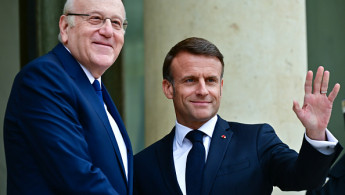Macron urges Netanyahu to prevent Israel-Hezbollah 'conflagration'
French President Emmanuel Macron on Tuesday urged Israeli leader Benjamin Netanyahu to prevent a "conflagration" between Israel and Hezbollah militants in Lebanon, during a telephone call between the two leaders.
Macron "reiterated his serious concern over a deepening of tensions between Hezbollah and Israel... and underscored the absolute need to prevent a conflagration that would harm the interests of Lebanon as well as Israel," the French presidency said in a statement.
He also insisted on the "urgency for all parties to move rapidly toward a diplomatic solution" to end the conflict sparked by the October 7 attack on Israel by Hamas militants in Gaza.
"The two leaders discussed the diplomatic efforts underway towards this," the Elysee Palace said, ahead of a visit by the US envoy for the conflict, Amos Hochstein, to Paris on Wednesday.
Hochstein is scheduled to meet with Macron's Lebanon envoy Jean-Yves Le Drian following visits to Israel and Lebanon in June to try to secure a ceasefire in Gaza.
Macron also called on Netanyahu to refrain from any "new operation" in Gaza near Rafah or Khan Yunis, "which would only aggravate the human toll and a humanitarian situation that is already catastrophic", the Elysee said.
The Israeli army on Monday ordered the evacuation of most areas east of Khan Yunis and Rafah along the Egyptian border.
It did not explicitly announce a military operation, but such orders have typically preceded major offensives.
The announcement sparked a mass exodus of Palestinians from parts of southern Gaza on Tuesday as Israeli forces launched deadly strikes and clashed with militants.
Hamas's October 7 attack on southern Israel that triggered the war resulted in the deaths of 1,195 people, mostly civilians, according to an AFP tally based on Israeli figures.
The militants also seized 251 hostages, 116 of whom remain in Gaza including 42 the army says are dead.
Israel's retaliatory offensive aimed at eradicating the Palestinian militants in Gaza has killed at least 37,925 people, also mostly civilians, according to data from the health ministry in the territory.
Macron and Netanyahu also discussed recent "developments" in Iran's nuclear programme, in particular reports of "the installation of new centrifuges" for enriching uranium.
In mid-June, the International Atomic Energy Agency said Tehran was further expanding its nuclear capabilities, with Western nations fearing the country is pursuing nuclear weapons following the US withdrawal from a 2015 deal to limit its atomic programme.
The IAEA has said that Tehran has significantly ramped up its nuclear programme and now has enough material to build several atomic bombs, though Iran says it is only for peaceful purposes.
"France, with its partners, remains fully committed to continuing to exert pressure on the Iranian government, which must respect its international obligations and fully cooperate with the IAEA," Macron's office said.




 Follow the Middle East's top stories in English at The New Arab on Google News
Follow the Middle East's top stories in English at The New Arab on Google News


![A group of Palestinians, foreign and Israeli activists gather to participated in an olive picking event on the land in the town of Battir, which is under threat of confiscation by Israel in Bethlehem, occupied West Bank on 8 November 2024. [Getty]](/sites/default/files/styles/image_330x185/public/2182930803.jpeg?h=199d8c1f&itok=__0LgGsa)